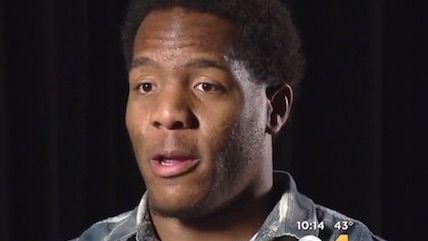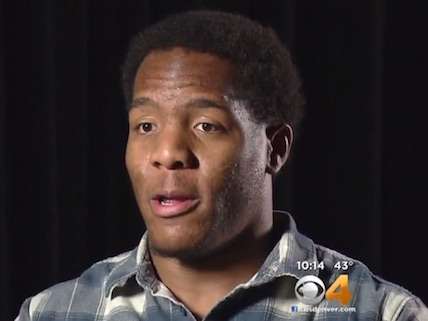Interview: This Male Student Was Expelled for Raping His Girlfriend Even Though She Said He Did Nothing Wrong
"I would not want this to happen to anybody," says Grant Neal, formerly of Colorado State University-Pueblo. "I wouldn't wish this upon my worst enemy."


There was one moment during Colorado State University-Pueblo's investigation into sophomore Grant Neal—an athlete accused, and eventually expelled, for sexually assaulting his girlfriend—that made Neal realized he was about to be railroaded.
Neal's girlfriend, Jane Doe, never accused him of wrongdoing, and famously stated, "I'm fine and I wasn't raped." But CSU-Pueblo initiated an inquiry into their forbidden relationship, which violated an informal rule about physical trainers dating athletes. The university prohibited them from contacting one another during the course of the investigation, but Doe paid little heed to the no-contact order and sent Neal several supportive messages.
Neal, though, was worried her messages could get him in even more trouble, so he promptly informed Roosevelt Wilson, the university official charged with investigating the matter under Title IX—the federal state prohibiting sex-based inequality at institutions of higher education.
"it really hit me after the second meeting I had with the Title IX officer, Roosevelt Wilson," Neal recalled during an interview with Reason.
Neal asked Wilson what he should do about the fact that Doe was still texting him.
"I said, well, she's snapchatted me, what do you want me to do? He told me to open [the snapchat messages] and take a screenshot and send them to him, so I did that," he said.
This turned out to be bad advice.
"[Roosevelt's] email response back to me was, you could be potentially be in complication with your no contact order for opening the snapchats that she sent you," said Neal.
In other words, the man in charge of investigating whether Neal had raped a woman—a woman who emphatically stated that Neal had not done so—first told Neal to open emails from his girlfriend, and later told him he could be disciplined for opening them.
"That's when I immediately knew," said Neal. "That's when I really knew that the situation was above my control."
This was just one of many injustices perpetrated against Neal by his university. After denying Neal any meaningful way to demonstrate his innocence, CSU-Pueblo effectively ended his career, cancelling out his scholarships and opportunities to play football and pursue a wrestling career.
"One day I woke up and I had all my dreams in front of me and I was doing very well academically and on the football field, and then I just got a wrestling scholarship, and for that to be yanked away from me for no justifiable reason… that's hard to cope with," said Neal.
More than a year after being expelled, Neal has finally achieved a victory of sorts: a magistrate ruled just last week that his pending lawsuit against CSU-Pueblo should not be dismissed. Neal has filed suit against the university and its board of regents, as well as the federal Education Department. His lawsuit argues that CSU-Pueblo violated his due process rights, in part because of Title IX guidance from the Education Department's Office for Civil Rights.
The magistrate was not persuaded that OCR was to blame for Neal's situation and recommended dismissing his complaint against the feds. But the magistrate left room for him to amend this aspect of his lawsuit, and left intact his due process case against CSU-Pueblo.
When it comes to sexual assault allegations on college campuses, there are two sides to every story. Usually.
Neal's case is unique in that Doe, the alleged victim never made a complaint, and denied that Neal had done anything deserving of punishment.
Instead, a third party—who was an acquaintance of Doe's—made the complaint. This person, a female student and trainer, spotted a hickey on Doe's neck and surmised that she had been assaulted by Neal. Doe texted Neal to let him know he was likely to be questioned by university officials.
At the time, Neal had no idea his life was about to be made a living hell. In fact, he was worried Doe would be in trouble—for dating an athlete. When he went to meet up with Doe, he assumed he was going to "console" her.
"What happened then was she just seemed very visibly upset so my immediate reaction was that she probably got kicked out of the athletic training program," Neal says.
Instead, Doe began to explain to Neal that the other trainer had suggested to Dr. Richard Clark—director of the athletic training program—that Doe might have been assaulted by Neal. Clark immediately informed his wife, who was a CSU-Pueblo faculty member, and Wilson.
Doe attempted to put an end to the matter at once: Neal recorded her making the definitive statement, "I'm fine and I wasn't raped" to university officials. But no one cared. In the eyes of the university, it was not Doe's place to determine whether she was a victim of sexual assault—that was Wilson's job.
"I was just under the impression that there was a big mix-up and I didn't understand the magnitude of the situation that I was really in at that time," says Neal.
What followed was a mockery of due process. Roosevelt met with Neal and thrice accused him of raping Doe. At this point in time, no one had suggested to Neal that he should consult a lawyer, let alone inform him of the seriousness of his situation.
The investigation continued, even though Doe did not consider herself a victim of assault and was in fact interested in continuing her relationship with Neal. She even engaged in consensual sex with him the night after the Title IX investigation began.
Incidentally, this act was accidentally witnessed by one of Neal's roommates, and he thought it should count as evidence in his favor. But Wilson declined to interview the roommate. Wilson went so far as to lecture Neal that it was his job—not Neal's—to decide which witnesses were worth interviewing.
"[Wilson] would deem things evidence if he wanted to," says Neal. "He didn't allow me to call any witnesses in my favor."
Since Wilson wasn't interested in any opinion that contradicted his theory of what happened, his investigative report could reach only one conclusion, even if that report contradicted the opinions of both Neal and Doe. In early December of 2015, Wilson submitted his report to Jennifer DeLuna, CSU-Pueblo's director of diversity and inclusion. Neal was given just 24 hours to make himself available to appear before DeLuna. This meeting was, in Neal's view, a "sham."
"It wasn't actually a hearing at all," says Neal. "I was allowed to have legal counsel there if I wanted to, but the legal counsel wasn't allowed to counsel."
This meeting represented Neal's first opportunity to read the report and take stock of the charges against him, and the university's evidence. He was not allowed to make a copy of the report—all he could do was try his best to commit it to memory.
Note that the report was not an exact transcript of Wilson's conversations with relevant witnesses: it was merely Wilson's recollection and summarization of those conversations. According to Neal, it contained numerous factual errors. For instance, the report cited the Clarks as claiming that Doe did not consent to sex with Neal. Neal says that's a clear mistake: Doe did not consent to unprotected sex, but enthusiastically agreed to have sex with Neal after he put on a condom.
On December 18, DeLuna informed Neal that he would be suspended for sexual misconduct until Doe finished school. Neal's lawsuit alleges that DeLuna's decision contained further errors: it referred to Doe as the complainant, even though Doe never made any complaint against Neal.
Neal appealed the decision. His appeal was denied.
In the months that followed, it was difficult for Neal not to succumb to depression. He made several attempts to transfer schools, but was denied admission every time. His status as a sexual misconduct violator killed his chances.
"It's one thing for someone to tell you that your dreams aren't attainable but to have that written to you on multiple occasions and still have to apply and try, and still to keep going forward… I can't even begin to describe the pain," says Neal, beginning to choke up.
He became a nutrition specialist at GNC, and draws strength from his grandmother, who reminds him to "control the controllables." He's currently watching his friends prepare to graduate and pursue opportunities that are no longer available to him.
It's an experience that would make anyone bitter, though Neal says he doesn't hold Doe responsible. How could he, when she never complained?
"I blame Roosevelt Wilson for conducting a non-impartial investigation," he says. "I blame the university for standing by and watch a miscarriage of justice happen. I blame Title IX and the Department of Education for profiling males in a certain manner, scaring universities into making decisions that aren't necessarily just."
There are other issues. Neal, like so many male students disciplined as a result of Title IX investigations, is an athlete of color. And Doe, like so many alleged victims, is a white woman. Could racism have been a factor here? Neal doesn't want to believe so—he hates to "assume the race card"—but finds it hard to ignore.
"I want to think that that's not true but I wouldn't put it past them," he says. "It's terrible, and black, white, Latino, I would not want this to happen to anybody. I wouldn't wish this upon my worst enemy."
Neal pauses.
"I wouldn't wish this upon Roosevelt Wilson, who put me through this," he says.
Dozens of wrongfully punished students have brought lawsuits against universities. Neal's is novel in that it seeks to hold the federal government responsible for eroding due process rights on campuses. At Reason and elsewhere, I have made the case that the Education Department's Title IX guidance does not comport with basic principles of justice, and should be revised.
Unfortunately, it was this aspect of Neal's lawsuit that the magistrate contested. The magistrate's recommendation suggests that CSU-Pueblo's treatment of Neal was so glaringly unfair, it might be a stretch to blame the government.
And yet OCR's Title IX guidance is at the center of so much of the college war on due process. Universities are worried that they will lose federal funding if they do not obey the dictates of OCR, which requires the use of the preponderance of the evidence standard while discouraging cross-examination. This puts many accused students in a position where they are unable to prove their innocence, because they have been deprived of the means to do so.
"One rape on the campus is horrible and I will not stand for it whatsoever," says Neal. "But then again, one false accusation does not solve the problem. I really feel like the Title IX proceedings and things like that are a band-aid solution to a bigger problem, and I feel like it's not going to help anything."


Show Comments (81)